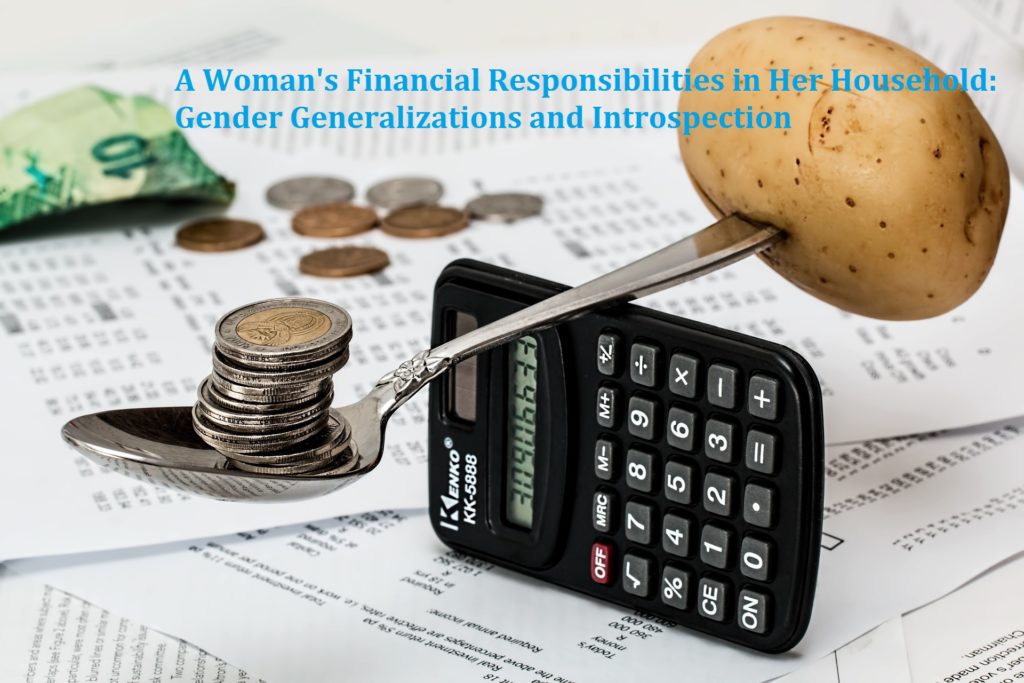In Part I of A Woman’s Financial Responsibilities in Her Household, I discuss some gender generalizations regarding how money responsibilities are handled in a typical household and share with you some introspection regarding my situation during the earlier years of my marriage.
There are many aspects to personal finance and financial planning, ranging from budgeting, paying for a vacation, purchasing a home, purchasing insurances, retirement planning and estate planning. This is important to keep in mind as we discuss household financial responsibilities.

Gender Generalizations
In most households, the typical stereotype type is that the wife is responsible for balancing the checkbook (e.g., managing the day-to-day budget) while the husband attends to bigger picture financial planning (e.g., purchasing insurances, tax planning and investing retirement funds).
Certainly, there are households where the wife doesn’t participate much in or any part of the family’s financial responsibilities. This was illustrated in a 2013 Fidelity Investments Couples Retirement Study, where two in ten women admitted to having only some or no input into the day-to-day financial decisions in their households. Then, there are households where the wife is the CFO. And in between, there are households where both the wife and husband participate equally in every aspect of the family’s financial situations.
In general, though, women still view managing and balancing the family’s checkbook and budget as a woman’s role. These women believe such responsibilities are traditionally deemed more feminine. Husbands, on the other hand, are more suited to attending to the bigger picture household financial planning, as they are being seen more technical savvy and/or have a higher risk tolerance personality.
This gender generalization around household money management is evident in the 2014-2015 Prudential study on Financial Experience & Behaviors Among Women. The study reported that women respondents ranked themselves highest on their knowledge of managing debt and managing money (about 30% gave themselves an “A”) and lowest on their knowledge about generating an income stream in retirement and investing (less than 10% gave themselves an “A” and many gave themselves “F”). Such findings certainly give some insights into what women in general value and do well at when it comes to financial responsibilities in the household.
Many of my married girlfriends recalled their mothers taking care of the family’s basic day-to-day budget. Once married, my girlfriends just automatically followed their mothers’ footstep when it came to managing finances in their own households. Yet, when it came to their household’s bigger picture financial planning, many of my girlfriends didn’t have much of a clue.
For instance, some didn’t know all the various liabilities they have, some didn’t know all the different retirement accounts their husbands have, some didn’t know if their husbands received stock options as part of the compensation package, some didn’t know how much their husbands were putting into their deferred tax accounts, some didn’t know what their car and/or home insurances covered (or would not cover), some didn’t know if their husbands had disability insurance, some didn’t know how many brokerage accounts they had, many didn’t know what universal liability insurance is, and the list went on and on. Their husbands were taking care of those responsibilities and didn’t always involve their wives in the process, either consciously or subconsciously.
Throughout those conversations and discoveries many of my girlfriends expressed a lack of time to spend on long-term financial planning. I could relate in many ways. Like my girlfriends, I was happy filling my day with work, childcare, household chores and exercises. I enjoyed spending time planning social events for myself and my family. I took pride in doing interior decorating, planning for holiday gatherings and shopping for the lowest bargains (extremely time consuming).
When would I have had the time to learn about investing in the stock market, keep track of my family’s investment portfolio performance, peruse through the IRS website to reduce family income tax, learn to calculate how much life and/or disability insurance my family needs, or work on estate planning with my husband?
I’m sure if my life situation forced me to I would have done all that and perhaps more, however, my husband was taking care of all those financial responsibilities so that I didn’t have to. We were each great and efficient at what we “owned”. That was the whole idea behind the concept, division of labor, right? At least I thought so.
